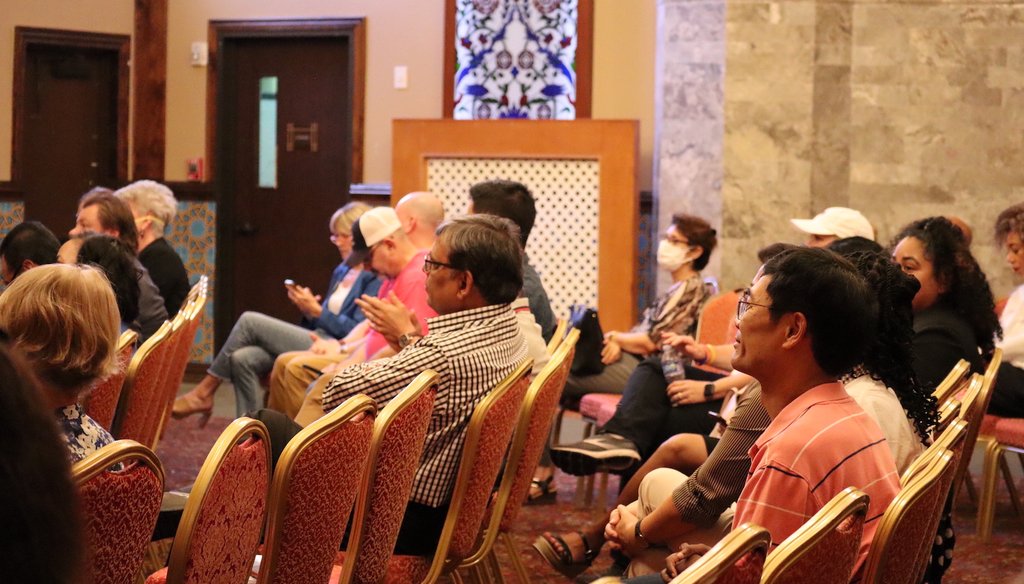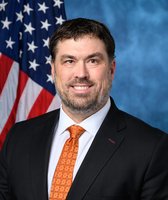Stand up for the facts!
Our only agenda is to publish the truth so you can be an informed participant in democracy.
We need your help.
I would like to contribute

Attendees listen to local candidates at a Houston forum on Oct. 16, 2022. Emgage Texas, a nonpartisan civic engagement organization serving Muslim Texans, and local organizations hosted the forum. (PolitiFact Texas)
If Your Time is short
- Texas voting advocates address misinformation on encrypted messaging platforms, like WhatsApp, as they encourage voting and civic engagement.
Civic engagement organizers serving Texas immigrant communities are turning their attention to encrypted messaging apps as a platform for sharing critical information.
University of Texas researchers found that misinformation on encrypted messaging apps like WhatsApp, Telegram and Signal uniquely affect diasporic communities because the apps are favored platforms among them. Organizers say countering misinformation and sharing dependable information there have become part of their strategy to engage voters.
The role of encrypted messaging apps in immigrant communities
Azra Siddiqi, founder of WiseUp TX, has turned her attention to messaging platforms as a potential channel to share information on voting.
WiseUp believes that South Asian Texans, a diverse and fast-growing demographic, are a powerful group of voters to mobilize. Asian Americans and Pacific Islanders overall make up 4.6% of the state electorate, according to American Community Survey data analyzed by APIAVote and AAPI Data. Eligible Asian American and Pacific Islander voters in Texas grew by 74% from 2010 to 2020, according to that analysis.
WiseUp has expanded its reach with a podcast and on social media, but it turns out the encrypted messaging platform WhatsApp is an important tool. Many South Asian community members, especially from the older generation, use the messaging app, and it becomes a natural platform for politics, Siddiqi said. WiseUp shares voter information videos in at least eight languages, and Siddiqi said WiseUp heard anecdotally from community members that their videos thrive on WhatsApp.
"When we were doing our videos in 2018, we had certain campaigns use our videos or other smaller nonprofit orgs that were within their city limits, like Houston or Dallas — they were the ones who shared them on WhatsApp," Siddiqi said. "And that's how our videos gained so much traction."
Research from the University of Texas Center for Media Engagement in March found that diaspora communities uniquely rely on messaging apps because they allow people to form groups online and are often used to keep in touch with people in their family's country of origin.
The research focused on community leaders of Hispanic, Black and South Asian diasporic communities in swing states such as Florida and North Carolina. Researchers found that the creation of these groups on secure messaging apps helps build confidence for historically marginalized individuals.
"It’s not just private communication that’s happening; this has political significance," said Inga Trauthig, researcher at the Center for Media Engagement. "Especially when COVID hit, a lot of those groups that were initially COVID health groups turned political whenever there was something big going on, either in the state or nationally."
This comes about because people seek information in their own language. Anusheh Siddique, a Texas organizer for the Muslim American civic engagement nonprofit Emgage, said the Texans she serves cannot find voter information and polling locations in their own languages. The language diversity and lack of resources make it difficult to counter the misinformation flowing into these communities.
"Specifically in the AAPI space, we just have wide diversity and language capacity," Siddique said. "That is not only not being met — there seems to be no interest in meeting them, especially in terms of political education. And so the reason they’re turning to WhatsApp, the reason they’re turning to Signal, the reason they’re turning to LINE, is because they’re not finding language translation."
Helen Shih, a Houston-based advocacy consultant and community organizer, said a lack of civic education and community outreach exacerbates the effects of misinformation when misinformation circulates on these platforms.
"Immigrant communities also have their own language and social barriers, so they tend to cluster together in their own social media bubbles," Shih said.
With few resources to combat misinformation, Shih said, immigrant community members are often persuaded to vote against their own interest because of misinformation and disinformation — the latter defined as the intentional creation and sharing of falsehoods.
Shih, an organizer in Asian and Pacific Islander American Vote (APIAVote), says this problem is on their organization's radar, and they are evaluating how misinformation travels and how to best address it.
Pew Research Center data on social media use in 2021 found that American adults overall use WhatsApp far less than other platforms like YouTube, Facebook, and Instagram, but Hispanic Americans are much more likely to use WhatsApp compared with other demographic groups surveyed. According to a 2021 Nielsen Media Impact report, young Hispanic Americans ages 18 to 34 are twice as likely to use WhatsApp and Telegram compared with the general population.
Although social media platforms like Facebook are what Trauthig calls "open platforms," messaging apps are structured to be more intimate with group chats.
"Even if they’re in a big group, they still see themselves as communicating in a bit of a safe space. So that actually makes misinformation more potent, because you’re even quicker to believe it than something that you see on Facebook," Trauthig said.
University of Texas researchers documented examples of different kinds of misinformation on these platforms, such as misinformation that sows doubt among people of differing religious and ideological beliefs and ambiguously translated information. There was misinformation on voting; to discourage people from voting; and about political candidates and parties, Trauthig said.
Trauthig said an example of misleading messaging that flourished on these apps among diasporic communities was President Joe Biden repeatedly being called "anti-Catholic." Such messaging ignored that Biden is Roman Catholic, researchers found. The messaging targets Hispanic Catholics and was found in group chats alongside COVID-19 information.
Flooding the platform with dependable information to counter misinformation
Liz Lebron serves as research manager at Latino Anti-Disinformation Lab co-run by Voto Latino, a nationwide organization, and Media Matters for America, a nonprofit that seeks to counter conservative misinformation.
Lebron said one way to tackle encrypted misinformation is to remove misinformation from platforms such as Facebook and Instagram before it jumps to encrypted platforms. Such efforts are underway, for example, by Meta, which owns WhatsApp, Facebook and Instagram. But, Lebron said, more resources can be devoted to combating misinformation in languages other than English and collecting better data on what posts are being fact-checked and tagged.
"When it goes into an encrypted app, it’s really difficult to track it. That’s why it’s so important for the platforms that are public-facing to take down bad content. Because people are taking that content and moving it to private encrypted chats and spreading it there to their relatives and friends," Lebron said. "One way to cut down on that practice is to remove that misinfo from the public-facing platforms as best as we can, as fast as we can, as much as we can."
The National Association of Latino Elected and Appointed Officials, which operates in Austin, Houston and nationwide, launched Defiende La Verdad, a webinar program that trains Latino community members on how to spot misinformation and how to report it on Junkipedia, an online tool used to collect and analyze misinformation so it can be countered by journalists, civic organizations and researchers. Misinformation across many platforms, including messaging apps like WhatsApp and Telegram, can be reported.
"We are now at a stage where we're saying, ‘OK, this is going to be a permanent part of our organization's work to protect Latino voters and to protect the Latino community's participation in civic processes,’" said Juan Rosa, the association's national director of civic engagement.
Emgage Texas also has devoted resources to a webinar series on spotting disinformation.
Emgage uses WhatsApp for organizing, but when it comes to information sharing, many members of Muslim American communities will translate information provided by Emgage and share it across their own platforms and circles, Siddique said. This is most effective because these community members are already part of existing groups that people recognize and participate in.
WiseUp has observed a similar trend in their communities. Siddiqi said she's seen positive feedback when she personally texts or messages people and hopes to roll out a WiseUp-run WhatsApp group.
"We're hoping we can connect with community leaders who have grown those platforms — whether it's in Malayalam or Telugu or Urdu, Hindi, Bengali — and have those people on that WhatsApp group, so they can at least disseminate that information within their own respective groups too," Siddiqi said.
Because these messaging apps can't be easily monitored for misinformation because of their encryption, researchers and organizers say the best way to counter misinformation is to flood the platform with valid and dependable information.
"The real importance of it is people are able to easily forward content within other groups. I think that's why WhatsApp information spreads so quickly. It's because you can just sit there and quickly forward it to a different WhatsApp group that you're on," Siddiqi said. "And that's what we're hoping to capitalize on with a lot of our informational content."
Our Sources
Inga Kristina Trauthig and Samuel C. Woolley, "Escaping the Mainstream? Pitfalls and Opportunities of Encrypted Messaging Apps and Diaspora Communities in the U.S.," March 22, 2022
Meta, "Facebook's Fact-Checking Partners Fight Misinformation in Spanish," June 30, 2021
Emgage, "Disinfo part 2 Emgage webinar 9-7-22," Sept. 7, 2022
LEAD, Latino Education and Advocacy Days, Facebook, Defiende La Verdad Training Series, May 27, 2022
Interview with organizer Helen Shih, April 15, 2022
Email from organizer Helen Shih, April 17, 2022
Interview with Kyle Van Fleet, communications associate at APIAVote, April 12, 2022
Interview with Azra Siddiqi, founder of WiseUp TX, April 15, 2022
Interview with Liz Lebron at Voto Latino, April 18, 2022
Nielsen, "Inclusion, Information, and Intersection: The Truth About Connecting With U.S. Latinos" with data from Nielsen Media Impact, June 2021
Pew Research Center, "Social Media Use in 2021," April 7, 2021
Interview with Anusheh Siddique at Emgage Texas, June 14, 2022
Interview with Inga Trauthig, research at the University of Texas Center for Media Engagement, April 8, 2022
Interview with Juan Rosa, National Director of Civic Engagement at NALEO, Sept. 16, 2022
AAPI Data and APIAVote, "2022 AAPI Voter Demographics by State: Texas"







































